高二外研版选修6 Module 3 Interpersonal Relationships-Friendship教案
- 格式:doc
- 大小:329.50 KB
- 文档页数:44
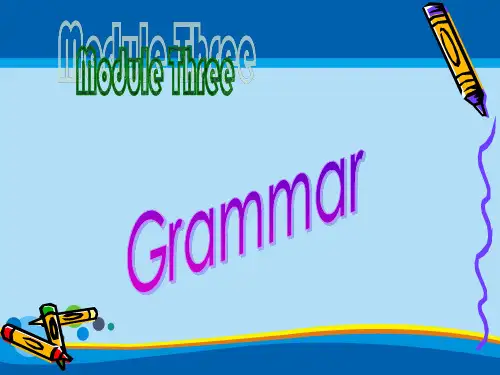
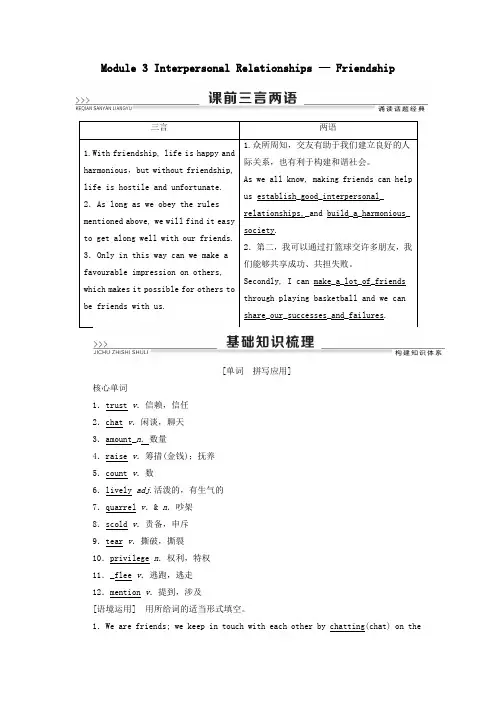
Module 3 Interpersonal Relationships —Friendship三言两语1.With friendship, life is happy andharmonious,but without friendship,life is hostile and unfortunate.2.As long as we obey the rulesmentioned above, we will find it easyto get along well with our friends.3.Only in this way can we make afavourable impression on others,which makes it possible for others tobe friends with us.1.众所周知,交友有助于我们建立良好的人际关系,也有利于构建和谐社会。
As we all know, making friends can helpus establish_good_interpersonal_relationships,_and build_a_harmonious_society.2.第二,我可以通过打篮球交许多朋友,我们能够共享成功、共担失败。
Secondly, I can make_a_lot_of_friendsthrough playing basketball and we canshare_our_successes_and_failures.[单词拼写应用]核心单词1.trust v.信赖,信任2.chat v.闲谈,聊天3.amount_n.数量4.raise v.筹措(金钱);抚养5.count v.数6.lively adj.活泼的,有生气的7.quarrel v.& n.吵架8.scold v.责备,申斥9.tear v.撕破,撕裂10.privilege n.权利,特权11._flee v.逃跑,逃走12.mention v.提到,涉及[语境运用] 用所给词的适当形式填空。
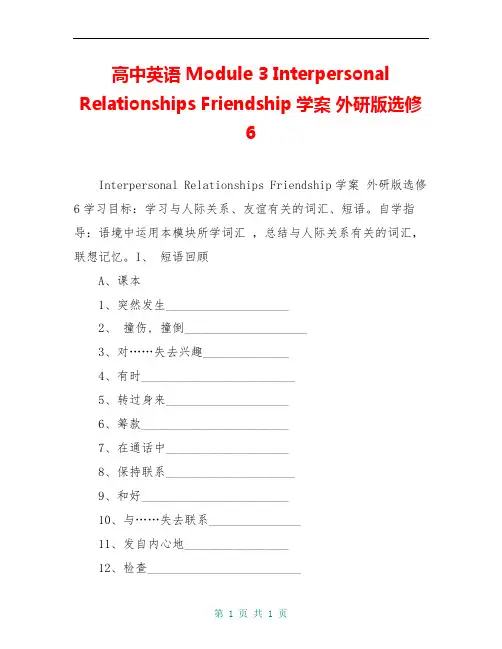
高中英语 Module 3 Interpersonal Relationships Friendship学案外研版选修6Interpersonal Relationships Friendship学案外研版选修6学习目标:学习与人际关系、友谊有关的词汇、短语。
自学指导:语境中运用本模块所学词汇,总结与人际关系有关的词汇,联想记忆。
I、短语回顾A、课本1、突然发生____________________2、撞伤, 撞倒____________________3、对……失去兴趣______________4、有时_________________________5、转过身来____________________6、筹款________________________7、在通话中____________________8、保持联系_____________________9、和好________________________10、与……失去联系_______________11、发自内心地_________________12、检查_________________________13、与……联系上_______________14、属于_________________________15、听说过_____________________16、与……相处得很好_____________17、快乐的时光_______________18独生子女_____________________B、创新思维1、达到,合计 ___________2、知己,密友____________________3、把、、、、、、算上_____________4、指望________________________5、生物__________________6、现场直播的音乐会_____________7、课文注释______________8、养牛________________________9、使人感到遗憾的是________10、把、、、击倒,敲落________________II、要词解析1、confront vt、降临于,使、、、无法回避;解决,处理;面对,对抗confront sb、 with sb、/sth、使某人面对或正视(令人不快,令人头疼等的)人或物 be confronted with 面对(某事) Only when the police confronted her with evidence did she admit that she had stolen the money、在警察让她面对证据时她才承认偷了钱。
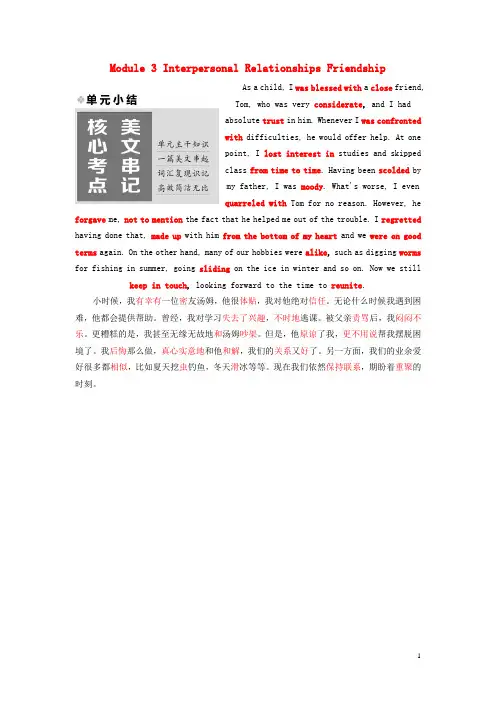
1 Module 3 Interpersonal Relationships FriendshipAs a child, I was blessed with a close friend,Tom, who was very considerate , and I hadabsolute trust in him. Whenever I was confrontedwith difficulties, he would offer help. At onepoint, I lost interest in studies and skippedclass from time to time . Having been scolded bymy father, I was moody . What's worse, I evenquarreled with Tom for no reason. However, heforgave me, not to mention the fact that he helped me out of the trouble. I regretted having done that, made up with him from the bottom of my heart and we were on good terms again. On the other hand, many of our hobbies were alike , such as digging worms for fishing in summer, going sliding on the ice in winter and so on. Now we stillkeep in touch , looking forward to the time to reunite .小时候,我有幸有一位密友汤姆,他很体贴,我对他绝对信任。
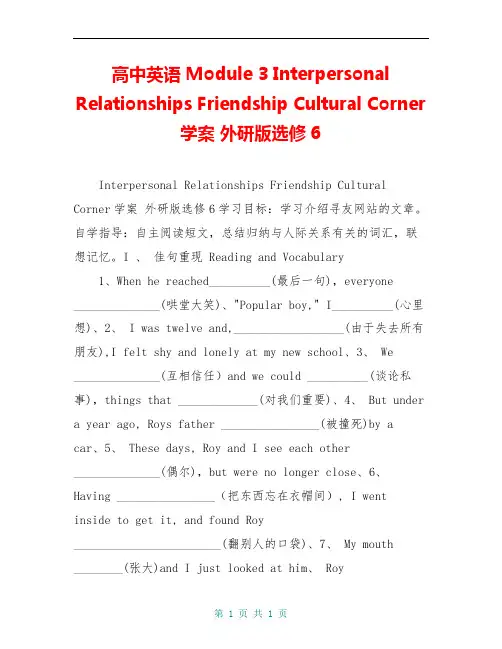
高中英语 Module 3 Interpersonal Relationships Friendship Cultural Corner学案外研版选修6Interpersonal Relationships Friendship Cultural Corner学案外研版选修6学习目标:学习介绍寻友网站的文章。
自学指导:自主阅读短文,总结归纳与人际关系有关的词汇,联想记忆。
I 、佳句重现 Reading and Vocabulary1、When he reached__________(最后一句),everyone______________(哄堂大笑)、"Popular boy," I__________(心里想)、2、 I was twelve and,__________________(由于失去所有朋友),I felt shy and lonely at my new school、3、 We______________(互相信任)and we could __________(谈论私事),things that _____________(对我们重要)、4、 But under a year ago, Roys father ________________(被撞死)by a car、5、 These days, Roy and I see each other______________(偶尔),but were no longer close、6、Having ________________(把东西忘在衣帽间), I went inside to get it, and found Roy________________________(翻别人的口袋)、7、 My mouth________(张大)and I just looked at him、 Roy_____________(满脸通红)、8、 I could feel a lot of_________(纸币)and I _____________(掏了出来)、9、 At that moment, the door ________(swing)open, and Roy walked in、 Everyday English1、Were _________________means were very similar、2、_______________ means meet in order to do something nice、3、 _______________means like each other a lot、4、______________ means this is what I predict、5、_____________ means to like each other and understand each other、Cultural Corner1、Friends Reunited brings together---________(也就是),unites----old friends,people who _______(曾经)be friends with each other、2、 She and her husband________(意识到)that the internet was the perfect way to _________(和某人取得联系)old friends,、、、3、 Slowly, people __________(听说)the site and ____________(变得有兴趣)、4、 Then the website was ______________(在收音机节目中提到)and suddenly the site became very popular、5、 For example, there is the extrordinary story of a man who______________(失忆)as a result of a bad car accident、6、、、、and with their help,he was able to find out about his past and __________(恢复记忆)、7、____________(那是不可能的)to find my daughter without the help of Friends Reunited、 II、习题精选1、Keeping what belongs to another person ______ to stealing、A、 appliesB、 accountsC、 attachesD、 amounts2、 I hope you didnt mention my name ______ her、A、 ToB、 forC、 atD、 from3、 My brother and his wife are ______、A、 a happy coupleB、 happy coupleC、 happy couplesD、 a happy couples4、 The teacher asked his students to stop ______ to listen to him, so they stopped ______ him、A、 writing; listening toB、 to write; to listen toC、 writing; to listen toD、 to write; listening to5、 I told the driver that he had knocked two people ______ their bicycles and had nearly caused a dad accident、A、 intoB、 offC、 onD、 out of6、 Ill try harder to make my work ______、A、 very perfectB、 perfectC、 more perfectD、 perfecter7、 A few days after the interview, I receive a letter ______ me the job、A、 offeredB、 offersC、 offeringD、 to be offered8、 The police ______ into the room and caught the murderer、A、 burstB、 enteredC、 lookedD、 shouted9、 "Cant you read?" Mary said ______ to the notice、A、 angrily pointingB、 and point angrilyC、 angrily pointedD、 and angrily pointing10、--- I regret _______ that you dont pass the exam、- Oh, I regret _______ harder、A、 saying; not having workedB、 to say; not to workC、 saying; not to workD、 to say; not having worked11、---What are you going to do?- Im going to attend a ______ concert directed by Andy Lin、A、 liveB、 aliveC、 livelyD、 living12、 ______ the programme, they had to stay there for another two weeks、A、 Not completingB、 Not completedC、 Not having completedD、 Having not completed13、 We wanted to get home before dark, but it didnt quite ______ as planned、A、 make outB、 turn outC、 go onD、 come up14、 ______ many times, this radio receiver is found of great use in the mountainous area、A、 Being testedB、 Having been testedC、 Having testedD、 Testing15、 His suit has become loose、 He seems ______ weight、A、 to loseB、 being lostC、 losingD、 to have lost反思巩固:Keys to the ExerciseII、习题精选1-5 DAACB6-10BCAAD11-15ACBBDIII、完形填空1-5 DADBB6-10 BDADC11-15BCDCB16-20 BDADC1、accept、、、as(to be)、、、把、、、当作、、、;认为、、、是、、、由上句unusual 可知为normal2、 For example, Government workers in Washington,D、C、 frequently work sixty to seventy hours a week、举例说明上句、3、没人逼迫他们,是他们自己想这样、4、 serious adj、严肃的,认真的,严重的、废寝忘食工作有时会是一个严重的问题、5、 that is, they might not enjoy movies, sports, ou other types of entertainment、由句中的might 可知,这些人或许不知道怎样放松、8、 Heart attacks and stomach diseases are physical ones、9、 besides adv、此外;而且 eg: I dont want to come out now, and besides, I must work、。
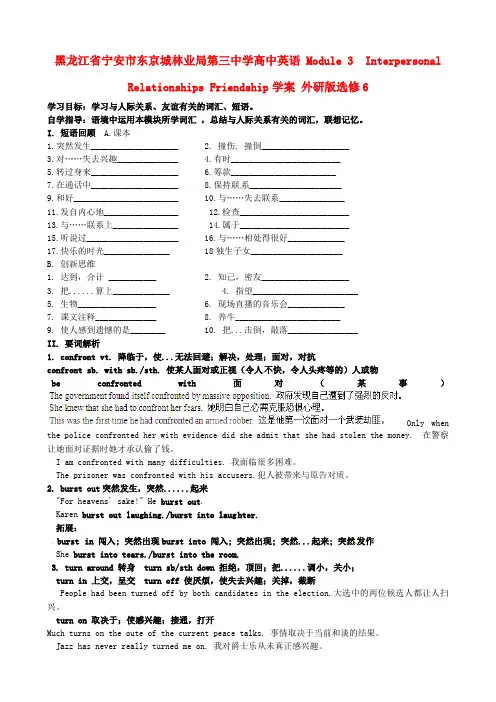
黑龙江省宁安市东京城林业局第三中学高中英语 Module 3 Interpersonal Relationships Friendship学案外研版选修6学习目标:学习与人际关系、友谊有关的词汇、短语。
自学指导:语境中运用本模块所学词汇,总结与人际关系有关的词汇,联想记忆。
I. 短语回顾 A.课本1.突然发生____________________2. 撞伤, 撞倒____________________3.对……失去兴趣______________4.有时_________________________5.转过身来____________________6.筹款________________________7.在通话中____________________ 8.保持联系_____________________9.和好________________________ 10.与……失去联系_______________11.发自内心地_________________ 12.检查_________________________13.与……联系上_______________ 14.属于_________________________15.听说过_____________________ 16.与……相处得很好_____________17.快乐的时光_______________ 18独生子女_____________________B. 创新思维1. 达到,合计 ___________2. 知己,密友____________________3. 把......算上_____________4. 指望________________________5. 生物__________________6. 现场直播的音乐会_____________7. 课文注释______________ 8. 养牛________________________9. 使人感到遗憾的是________ 10. 把...击倒,敲落________________II. 要词解析1. confront vt. 降临于,使...无法回避;解决,处理;面对,对抗confront sb. with sb./sth. 使某人面对或正视(令人不快,令人头疼等的)人或物be confronted with 面对(某事)Only when the police confronted her with evidence did she admit that she had stolen the money. 在警察让她面对证据时她才承认偷了钱。
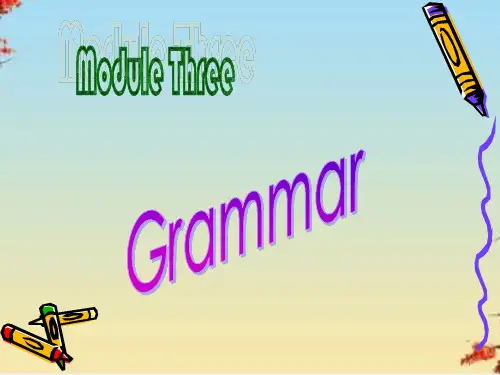

Module 3 Interpersonal Relationships — Friendship Ⅰ. 模块教学目标Ⅱ. 目标语言Ⅲ. 教材分析与教材重组1. 教材分析本模块以人际关系中最重要的元素——友谊为话题, 通过谈论人际关系和友谊、阅读故事及介绍自己的好朋友等方式,使学生对友谊有更深刻的认识和理解,并能用已有的社会知识、亲身体会、用所学的语言知识和技能,听懂以讨论人际关系、谈论友谊为内容的材料,理解课文关于友谊的深刻意义,描述自己与朋友之间友谊的发展过程。
1.1 INTRODUCTION 以一组对人际关系观点的测试引入关于友谊的话题并对此加以讨论,辅以两个活动来学习有关友谊的词汇和短语。
这一活动既呈现了本模块的中心话题——友谊,又为以后关于Friendship的进一步学习打下基础。
1.2 READING AND VOCABULARY包括一篇阅读课文和五项活动。
其中Activity 1是阅读前的热身活动。
设计了根据故事的开头和结尾推断故事的内容、情节的活动,为下一步的阅读留下悬念。
Activity 2的任务是:用浏览的方式在课文中快速找出特定的信息用以回答问题。
这两项活动的技巧性和实用性都很强,既能提高学生的阅读兴趣,又训练了学生的阅读技巧。
Activities 3, 4 &5是针对评价学生对课文的理解程度和学习课文中关于人际关系的词汇和短语而设立的三项任务,用于课文学习之后。
供阅读的课文是一篇题为“Roy’s Story”的关于人际关系和友谊的故事。
故事用第一人称叙述的手法,情节并不复杂,没有给出明确的结尾,为启发学生对于友谊和朋友的深层意义的思考留下了足够的空间。
1.3 GRAMMAR (1) 的主要任务是学习现在分词的完成体having done作状语的用法。
其中设计了五项任务,要求学生分别以①回答问题,总结该语法内容的意义和用法;②句型转换;③连线造句;④改写句子;⑤完形填空等多项活动来操练这一语法项目。
练习设计多样、充分。
教师可在此基础上做些拓展性和巩固性练习设计。
1.4 SPEAKING 设计了两项活动。
第一项活动要求在学习课文和语法的基础上,以轮流复述课文的形式来运用所学习的语法知识。
第二项活动深入到了课文的思想内容,要求学生用讨论的方式发表对文中的“我”应该怎样做的看法,以提升对本模块的中心话题“友谊”的思想教育内涵。
1.5 LISTENING AND VOCABULARY 包括五项活动。
Activity 1要求学生阅读一篇短文并根据其回答问题。
Activities 2 &3是学习一些在短文和后面的听力材料中出现的有关人际关系的词汇和短语。
这三项活动为下一步的“听”作了充分的准备。
Activity 4是该部分的中心,要求学生在听的过程中捕捉细节信息,复述与所读的短文中不同的内容,并回答Activity 5中的问题。
这些活动的设计有明显的梯度,能很好地训练和提高学生的听力技能技巧,培养学生抓住听力材料中的要点信息、分析和总结的能力。
1.6 GRAMMAR (2) 设计在听力基础之上。
Activity 1要求学生使用在听力材料中出现的一些接-ing和to do作宾语时意义不同的动词完成句子,并从中体会这些词接-ing和to do的不同含义。
而Activities 2, 3, 4 &5都是为了操练和巩固这一语法项目而设计的。
由听力引出语法对学生来说是个新的挑战。
该部分实际上是听力材料内容的延伸。
1.7 FUNCTION AND SPEAKING 的任务主要是要求学生以对话的形式练习口语。
为了引导学生学会谈论人际关系,这部分共设计了三个项目,Activity 1为学生提供了作对话的步骤;Activity 2以回答问题的方式提供了谈论的方法;最后一项Activity 3在听力的基础上提供了谈论的素材,要求学生以扮演角色的形式完成对话。
1.8 EVERYDAY ENGLISH部分主要学习一些英语词句的习惯用法和意义。
教师可根据情况适当做些拓展性练习。
1.9 WRITING 要求学生描述自己建立人际关系的过程。
这一部分的设计为学生提供了明确清晰的写作指导,为学生的写作训练扫清了障碍。
1.10 CULTURAL CORNER 是一篇泛读文章。
向学生介绍了网络在帮助老友重逢、重温友情等方面所起的重要作用,有很强的时代感和人情味。
1.11 TASK 的主要任务是对学生进行口语训练。
要求学生以对话的形式描述与朋友之间产生的问题、解决的过程、方法和结果,并对怎样维护友情提出建议。
这部分所设计的五项任务层次清晰,内容连贯,为学生顺利进行口语训练提供了有效的帮助。
2. 教材重组2.1 无论从话题内容上还是从学习方式上分析,INTRODUCTION, FUNCTION AND SPEA-KING, EVERYDAY ENGLISH和TASK都是一致的,因此可将这几部分整合在一起,设计成一节任务型“口语课”。
2.2 READING AND VOCABULARY中的五项活动和作为课文的阅读材料是一个整体,设计成一节“阅读课”。
再将WORKBOOK 中V ocabulary的巩固性练习加进来,这一课时会非常充实。
2.3 GRAMMAR (1) 和紧随其后的SPEAK-ING整合在一起是一节完整的“语法课”。
因SPEAKING的任务是要求学生运用刚学过的语法知识复述课文,其作用恰好是巩固和活用所学语法,同时可把WORKBOOK中79页的语法练习1 &2充实到本课时中来。
2.4 根据本模块的特点, 可以把LISTENING AND VOCABULARY与GRAMMAR (2) 整合在一起上成一节“听力课”。
GRAMMAR (2) 要求学生抓住听力练习中的语法点,拓展该语法内容,是听力材料的延伸。
WORKBOOK中79页的练习3、4、5是配合GRAMMAR(2) 的,而83页的Listening and speaking 可作为本课时的补充。
2.5将CULTURAL CORNER中的阅读教材与WORKBOOK中的Reading 部分整合在一起,组成一节“泛读课”。
2.6 WRITING 和WORKBOOK中的Speaking and writing可整合成一节“写作课”。
3. 课型设计与课时分配1st Period Speaking2nd Period Reading3rd Period Grammar4th Period Listening5th Period Extensive Reading6th Period WritingIV.分课时教案The First Period SpeakingTeaching goals教学目标1. Target language目标语言a. 重点词汇和短语close, chat, friendship, lonely, relationship, shy, trust, predict, click, make friends, get to know, personal matters, close friend, two of a kind, get together, get on well, it’s my guessb. 交际用语I’ve known him / her for...We first met six years ago. I remember ... for the first time.We’re good / close / best friends.We (don’t) get on very well. We (don’t) trust each other.We ... quarrel.We see each other...We’ve lost touch. / We still keep in touch.2. Ability goals能力目标Enable the students to talk about friends and friendship, telling their partners what their ideas are about friendship and discuss how to keep friends.3. Learning ability goals学能目标Help the students learn how to talk about friendship.Teaching important points教学重点Let the students learn to describe their friends and the thoughts of friendship as well as learn some everyday English.Teaching difficult points教学难点a. How to express their ideas about friends, friend-ship, personalities and so on.b. Guide the students to learn to describe a problem with a friend and give advice on how to keep friends.Teaching methods教学方法Talking; pair work or group work.Teaching aids教具准备A computer and a projector.Teaching procedures & ways教学过程与方式Step I Lead-inT: Good morning / afternoon, boys and girls!Ss: Good morning / afternoon, Sir / Madam!T: Please look at the picture on the screen.Show the following picture on the screen.T: Do you know what the picture is about?Ss: Yes. It’s about an old Chinese story “Asking for guilt with sticks”.T: Good. Who would like to tell the story to the class?S: Let me try. The story happened during the Spring and Autumn Period. The two persons in the picture are Lin Xiang-ru and Lian Po. They’re both the upper officersof kingdom of Zhao. Once Lin Xiang-ru made a great contribution to the country and had a chance to reach a higher position. But the general Lian Po envied him and always tried to put him in trouble while Lin Xiang-ru tried to avoid Lian Po each time he met him. Finally, Lian Po knew about that and felt very sorry for what he did. To show his regret, Lian Po came to Lin Xiang-ru and asked for forgiveness with sticks on his back. Lin Xiang-ru was pleased to forgive him. They later became best friends and under their efforts together, Zhao became a powerful kingdom.T: That’s perfect. Let’s give him a big hand. So what can we learn from the story? S: Friendship is very important to everyone, and even to the management of a country.S: Yes. Everyone needs friends. In our daily life, if we have friends, we can live a happier and better life.S: If great persons have good friends, like Marx and Engels, they can help countries and the whole world.Step II IntroductionT: You’ve got the right thoughts. So during this class, we’ll learn something about the most important element in interpersonal relationships—friendship. I think this word isn’t unfamiliar to all of us. We have close friends, school friends and so on. What’s your own attitude towards friendship? I can’t help waiting to know. Look at some statements in Activity 1 on page 21 about friendship. Work in pairs to discuss whether you agree with them or not and explain the reasons to each other, starting like the example in Activity 4. Are you clear?Ss: Yeah!The students will have a discussion and tell each other their ideas about these statements. After a while, check their jobs.T: OK. The first statement is: Most people have only one close friend, someone they know really well. Do you agree with it? (The first pair)S: I don’t agree with that. A lot of people have more than one close friend. For example, the 108 heroes in the Outlaws of the Marsh, who would devote their lives to their friends, were all close friends.S: But I agree with it. Only one close friend is enough. Marx had only one close friend Engels. It was Engels’friendship that helped Marx finish his great work for the working people.T: Mm, both of you are reasonable. What about the second one? (The second pair)S: I agree with it. A good friend is a person who you can tell whatever you think in your mind and can help you; share your happiness and sorrow.S: I don’t agree. Even though you have a good friend, you can’t tell him all your personal matters. You must learn to deal with them by your own.T: A ll right. I see, you have different ideas. Well, what are your opinions on “Your friendship is as important as your relationship with your family”? (The third pair)S: I would like to argue that friendship is less impor-tant than relationship with family. Family is the most important part in our lives.S: I agree with my partner. Friendship will never take the place of the relationship of family. But I also think it is very important in our life. In my opinion, they are not the same and can’t be compared.T: Well done. Now, do you have any idea about “It takes time to really get to know someone and find out what they are like”? (The fourth pair)S: Yes, I think it’s right. Knowing a person needs time.S: I don’t think so because I have a best friend. The first time we met, we both thought it’s as if we had known each other for quite a long time.T: That’s true. “Everyone feels shy and lonely at some time in their life.”Your ideas? (The fifth pair)S: That depends. Different people have different dis-positions.S: But we are sometimes in a position where we’re helpless and sad. No one can avoid it.T: Well done. Then come to the next: “To make friends easily, you need to be very kind.” Is that right? (The sixth pair)S: Absolutely. We must be kind to each other.S: Yes, I feel the same. Kindness is the basis of making friends.T: Right. Then the last one: “To make friends easily, you need to be able to chat aboutunimportant things.” Do you think so? (The seventh pair)S: I agree. We can make friends via chatting. When we know each other well, we can tell some personal matters or something important for us.S: But I don’t think so. Marx and Engels were close friends and all that they talked about were important things. But I agree that for our common persons, chatting unimportant things makes it easy to make friends.T: You’re all great. You have your own opinions on friendship. That’s very good. Did you notice some phrases in the statements just now?Ss: Yes. You stressed them while reading. And we also can find them in Activity 3.T: Oh, you’re so smart. Tell me the phrases and make sentences with them.S: “Make friends”. He’s good at making friends.S: “Get to know”. I suddenly get to know that she is a cheater.S: “Personal matters”. It’s my personal matters, and none of your business.S: “Close friend”. Close friends can help you a lot when you are in trouble.T: Wonderful. You’ve developed a good habit to gather information. Now let’s learn some words about relationship. Look at Activity 2 and match the meanings with the words in the box. Then make new sentences based on the words. The first one?Ss: “Relationship”. Relationship is important to everyone.T: Good. Then the next?Ss: “Shy”. She’s shy when she meets strangers.T: Right. Then came to the third one.Ss: “Trust”. Trust yourself, you’ll be the winner.T: Wonderful. How about the next?Ss: “Friendship”. I value our friendship very much.T: Brilliant boy. The next one?Ss: “Chat”. He’s chatting with his friends happily.T: Oh, a happy scene. We’re coming to the last.Ss : “Lonely”. He felt lonely while studying abroad.T: Good job.Step III Function and SpeakingT: By what you did just now, I believe you’ve known much about friendship. We’ll start a new part now. You all have friends, don’t you?Ss: Yes, we do!T: Well, you must be eager to tell the class about the story between your friends and you, right? I’ll give you a chance. Work in pairs and talk to each other about your best friend using the questions in Activity 2 on page 28, according to the steps in Activity 1 on page 27. A few minutes’ 1ater, I’11 ask some of you to present the outcome of your ideas in the form of telling stories to the class. OK?The students will start to have a talk in pairs, while the teacher goes among them to see if they have any questions and directs the students’ activities.A few minutes later.T: Are you ready?Ss: Yes.T: Who want to be volunteers?Ss: (The first pair) Les us have a try.Possible stories:1. My best friend is my classmate. What is special, we have been in the same class since primary school. We know each other very well and we often have the same feeling. After all, we have stayed together so long. We sometimes quarrel about small things but not long we apologize to each other. We’re just like sisters.2. I met my best friend all by accident. One day I was playing basketball on the ground, suddenly I hurt my feet and they bled. They were nearly killing me. Fortunately, a boy crossed by and sent me to the hospital in time. My feet were cured and a good friend is also made. I value our friendship very much. He is a kind- hearted boy and I hope our friendship will last forever.T: Very good and wonderful! Thank you and sit down, please!Show the information in the listening text on page 25 for the students to do the pair work.T: Now let’s switch roles to act as a reporter and Liao Mei. By questioning and answering, we’ll learn more about their friendship.Let the students make the interview as being told and then check the work.Sample dialogue 1:A: When did you first meet each other?B: We met each other about nine years ago.A: How are you getting on? And how about your friendship now?B: We get on very well all the time and the friendship between us hasn’t changed a little. We treat each other just like family members.A: Have you ever quarreled?B: Yes, We have quarreled seriously three times. But each time we have made up and become best friends again.A: A firm friendship! Thank you.Sample dialogue 2:A: What do you two have in common?B: We both have very lively personalities and have a great interest in books.A: Do you always have the same idea about things in your life?B: Most of the time we have the same idea, but some-times we have a little forks. But that has no hurt to our friendship.A: Have you always been together now?B: No. We went to different colleges at the age of 18, but we keep in touch through e-mail and still stay best friends.A: You are really best friends. Thank you.T: Very good job! How I envy their friendship! What about you?Ss: Yes, we too.T: I wish you all best friends in your lives. Now we’ll come to Everyday English. Step IV Everyday EnglishT: Now turn to page 28 and look at each sentence in Everyday English. Please tell me what the words in bold mean. And try to remember them.Prepare a table on the screen. When the students speak out one phrase with one meaning, show them out with the sample sentence. Dick the mouse one by one.If time possible, manage the students to make more sentences.Step V TaskT: Now let’s start a new part. Sometimes good friends quarrel with each other. Now work in pairs to describe a problem you had with a friend and give advice on how to keep friends. I think it will be of great use to you. Here is a talking guide for you. Let’s learn how to do this kind of dialogue.Show the guidance on the screen.A sample dialogue:A: How did you know each other?B: We know each other via the Internet. We played the same game and felt happy talking to each other.A: Then what is the problem between you?B: One day I found that he sold my equipment of the game without informing me. I got very angry and quarreled with him on line.A: What happed next?B: Then he said sorry to me and told me that he really had some very important things to buy and phoned me quite a few times but couldn’t find me. So he decided to sell it first and tell me about it later. I also remembered that I was out those days and my phone is power off. So I forgave him. Now we are still good friends.A: So what do you learn from this experience?B: Friendship needs trust. Be patient before you want to lose your temper .Try to listen to and believe others, kind to your friends and learn to forgive others. Then you’ll be welcome.A: Please give us some advice on how to keep friends.B: Friends need respect, trust and understanding. Kindness and honesty are important for you to keep friends. Don’t forget to keep in touch with your friends.After the students have finished their jobs, ask some groups to act out their dialogues. There may be a variety of possible ideas to come up with.Step VI HomeworkT: You have done very well in the class. That’s all for this period. Homework for today:Try to find a song about friends and friendships and learn to sing, tasting the feeling in the song.In the next period, I’ll check your homework by asking you to sing the songs in either English or Chinese. Goodbye, everyone!Ss: Goodbye, Sir / Madam.The Second Period ReadingTeaching goals教学目标1. Target language目标语言a. 重点词汇和短语chat, trust, note, cloakroom, amount, locker, fair, charity, theft, swing, financial, moody, close friend, personal matters, burst out laughing, think to myself, knock over, from time to time, go bright red, turn round, raise moneyb. 重点句子When he reached the final line, everyone burst out laughing.But just under a year ago, Roy’s father was knocked over by a car.Roy and I see each other from time to time, but we’re no longer close.Having left something in the classroom, I went inside to get it.I turned round and walked out without saying a word.2. Ability goals能力目标Enable the students to talk about the friendship in people’s daily life. Let them know that friendship is one of the most precious things in the world.3. Learning ability goals学能目标Let the students learn how to talk about the friendship among people and how to make a brief summary about the importance of the relationships in people’s life.Teaching important points教学重点Help the students know something about the friendship and the relationships. Teaching difficult points教学难点a. Analyse the writing peculiarity of the text and the structure of some sentences.b. Summarize the main idea of each paragraph as well as the text.c. Guide the students to talk about the relationships in their life.Teaching methods教学方法Fast-reading and careful-reading; thinking and summarizing.Teaching aids教具准备A recorder, a projector and some slides.Teaching procedures & ways教学过程与方式Step I Lead-in and Pre-readingT: Good morning / afternoon, everyone!Ss: Good morning / afternoon, Sir / Madam!T: Every day in our life, many persons care for relationships among themselves and other people.Do you know why?Ss: They treasure their emotions.T: That’s right. But do you know the true reason?Ss: No. / Just a little. / Yes. / Don’t know much. ...T: With the development of society, our life is changing. The relationships become more and more estranged. Perhaps this is the true reason. At the end of last period I asked you to find some popular songs about friendship. Have you prepared?Ss: Yes.T: OK. Now I want some of you to sing these songs to feel the sincere emotion in your minds. When one is singing, the rest should listen. If you want to sing after him / her, you may put up your hands, and when I send a signal, the front one should stop and the next one will go on to sing without stop in order to save time. Are you ready? Ss: (Very excited) Yes!T: Who will be the first to sing your song?S: “Where are you from, my friend? Just like a but-terfly getting into my window.”S: “I don’t know how long you can settle. We have been separated for so long a time.”...S: I wa nt to sing a song, which is my favorite song: “Friends, Oh my dear friends, do you remember me now? If you are in trouble, please tell me now ...”S: I cannot wait any more. “You’ll set out today, my friend, cheer up ...”S: “I live lonely all these yea rs with rain and wind having errors and tears, but I still remember what insistence is.”S: “Friends walk together in their entire life, the old days will never again.”Ss: (Can’t help singing together) “One word, the whole life; the love of lifetime, a cup of wine.”“Friends never feel lonely, a calling‘friends’ you will know.”“There is a hurt, there is a pain; you have to leave, you have me in your side.”...T: Very good job! You are great! But time is lim-ited, and we have to come to Activity 1 on page 22. Read the beginning and end of the passage. Can you guess what kind the story is?After the students have a short discussion about that.S: I think it’s talking about a good friend of “mine”—Roy. His kindness gives “me”warm when “I”feel lonely.S: I don’t agree with you. I think this is a story about how the friendship between Roy and “I”has developed. Because “I remember the first time I met Roy ... I was so surprised that I just stood there ... Roy walked in.”T: OK, very good! Now let’s see who is right.Step II Fast-readingT: Let’s read the text: Roy’s Story. I will give you a few minutes to do a fast reading and then I will ask some questions about the story in Activity 2. Please begin.The students will skim the text with questions in Activity 2. A few minutes later.T: Are you ready? What about the first question?S: Roy likes telling joke and was a popular boy.T: And the second one?S: They become good friends.T: How did Roy change?S: He became silent and moody because of his father’s death.T: And the next one?S: Daniel saw that Roy was stealing other people’s money.T: What happened to the £500?S: It was stolen by someone.T: And the last one?S: He found the paper notes in Roy’s pocket!T: Very good! Now let’s listen to the tape on this text. This time, pay attention to the whole story and try to get the main idea of each paragraph.After playing the tape, give the students two or three minutes to think about the main ideas, allowing them to have a short talk about the text. Then check their work.T: Let’s talk about the main idea of each paragraph.Ask the students to present the main idea of each paragraph.The result may be as follows:Para 1: “I” had no friend when “I” came here.Para 2: Roy was kind to me and we became good friends.Para 3: Roy changed a lot, becoming silent and moody as his father died.Para 4: “I”saw Roy stealing others’ things.Para 5: “I” was not sure whether Roy was a thief.Para 6: The £500 was stolen by someone.Para 7: “I”decided to ask Roy about the theft only to find the £500 was in his pocket.Para 8: A no-end story’s end: “I”didn’t know how to deal with the problem. T: Very good! It seems that you know well about the text. But do you think more about the further meaning of the story? Such as how to help friends when they are in trouble and how to develop friendship and so on?Step III Careful-readingT: All of you have your own ideas about friendships and every idea has its reason. Let’s read the text again carefully to make sure your idea! And at the same time I’ll give you four questions on the screen to think about. When you finish your reading, I will check your answers.Show the questions on the screen.1. Why does Roy become silent and moody? Is he really bad seriously?2. As his friend, what can you do for him at such a time?3. How did Daniel do? Do you think he did very well?4. If you were “I”, what would you do?A few minutes later.T: Do you have any ideas about the first one?S: I think Roy is away from his classmates on purpose. Because his father died, he loses his hope to life and feels sad and empty. But he is not really bad seriously. He just needs help.S: Yes, I agree with you. But the other reason is his friends don’t help him promptly. S: I don’t think so, his good friend, Daniel, wants to help him, but Roy himself doesn’t want to talk to others. He just wants to keep himself away from other people. And then he becomes worse and worse.T: Roy has become a thief now. If you are his friends, what can you do for him at such a time? Do you give him up or help him?Ss: Certainly we should help him. He used to be a good student and he can tell right from wrong.T: How did Daniel do in the story? Do you think he did very well?S: Even though Daniel wants to help his good friend, he only wants, but doesn’t do something useful! He should talk to him promptly, but he didn’t, even trusted his friend. So I think Daniel didn’t do very well.S: But I think Daniel doesn’t give up his friend. He always wants to help Roy, that’s good. It’s not too late if he tries his best to help him at once.T: What would you do if you were Daniel?S: If I were Daniel, I would trust my good friend and help him run out of sorrow to become bright again. If I had not so much power, I would also try my best to save him. S: If I had not enough power, I would ask all his old friends to help him, talking with him, asking him to play with us, comforting him and so on. In one word, make him feel the warmth from friends.The students may have all kinds of thoughts about the questions. Control the time and situation and lead the students to the next step.T: I think you know some of the meanings about friend-ships. Now let’s have a deeper thought about our text and make summaries on different sides to show what we learn. The summaries of the story:Step IV Post-reading and Word studyT: Let’s look at Activity 3 on page 22. Find the same kinds of words according to the meaning given to us and make sentences using each kind of words.S: Three words can be found in the first meaning. They are “note, wallet, financial”. The paper notes in your wallet can solve your financial problem.S: In No 2: “theft, thief”. You cannot be a thief to do theft.S: “Knock over”. The drunk was knocked over by a car last night.S: “Move (house)”. The Rocks moved to a small town as Mr. Rock’s faith in his business.S: “Make (money)”. I want to make money myself.S: “Raise money”. I want to raise money from my uncle.S: “Amount”. There are amount of trees in the city.T: OK, well done! Now look at Activity 4. Form complete sentences according to the meaning given with the words and phrases found in the passage.S: Charity is an organization that gives money or help to people who need it.S: Cloakroom is a room where you can leave your coat, bag, etc.S: To burst out laughing means to suddenly start to laugh.S: Locker is a small cupboard that locks, used to keep books, clothes, etc. in a school or office.S: When your face becomes pink because you are em-barrassed, you will go bright red.S: Moody means often becoming angry or unhappy.S: Fair is something organized by a school to make money.T: You’re so good, my kids. Now, let’s choose the correct answers in Activity 5 one by one, OK?Let the students do Activity 5 and then check the answers with the whole class.Step V Vocabulary (P80)T: Now let’s deal with Exercise 6 on page 80. Please do pair works to write two or three pieces of advice to Sam. And then I will check your answers.Sample writing 1:Dear Sam,I think you should write her a letter to explain what you have done, even she is still angry. Apology is not a simple thing, it needs patience and sincerity. If you really want her pardon, you should let her feel happy. So good luck!JoeSample writing 2:Dear Sam,I know you are very worried about whether she will pardon you, but at first you should make sure what you have done to her. Have you said something making her angry? It is important how you can do to make up. Then, you can try to explain to her. Even though you would wait for weeks to apologize to her, wait her to calm down. These are my advice.JoeThen lead the students to do Exx. 7 and 8, then check them one by one.Step VI HomeworkT: Homework for today: Please write your own endings to the story, and tomorrow I would choose some of you to read your own ends. That’s all for today’s class! Good-bye, everyone!Ss: Good-bye, Sir / Madam!The Third Period GrammarTeaching goals教学目标1. Target language目标语言a. 重点词汇和短语shy, lonely, confront, count, underneath, chat, argue, on the phone, get to know, make good friends, move houseb. 重点句式Having lost all my old friends, I felt...Having left something ..., I went inside to get it.That weekend, having thought about the situation ..., I decided to...2. Ability goals能力目标Enable the students to use the adverbial clauses: having done correctly.3. Learning ability goals学能目标Help the students learn how to use the adverbial clauses: having done.Teaching important points教学重点1. “Having done” used as the adverbial clauses.2. Let the students try to use the new language in the grammar section to tell part of the text.Teaching difficult points教学难点How to teach the students to master t he usage of “having done” as the adverbial clauses.Teaching methods教学方法Concluding and summarizing; practice.Teaching aids教具准备A projector and a computer.Teaching procedures & ways教学过程与方式Step I RevisionT: Good morning / afternoon, everyone!Ss: Good morning / afternoon, Sir / Madam!T: Have you finished your homework?Ss: Yes!T: That’s good. First, work in groups of four and check your endings of the story one by one in your group. When all of you have finished, put up your hands and I’ll check one of you. Clear?Ss: Yes!The students will tell the endings of the story to each other in their groups. When they。